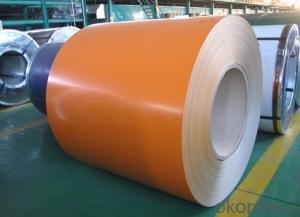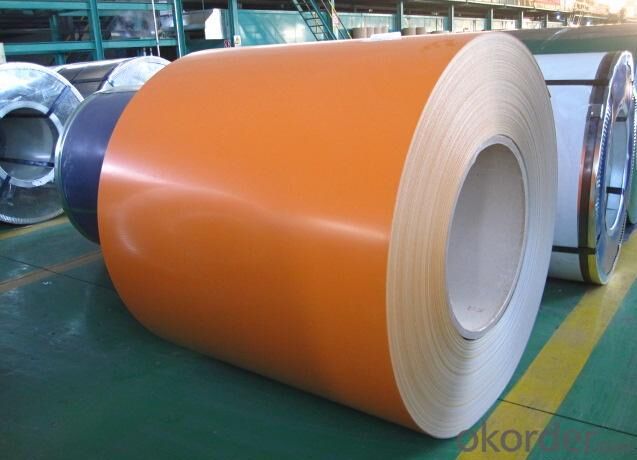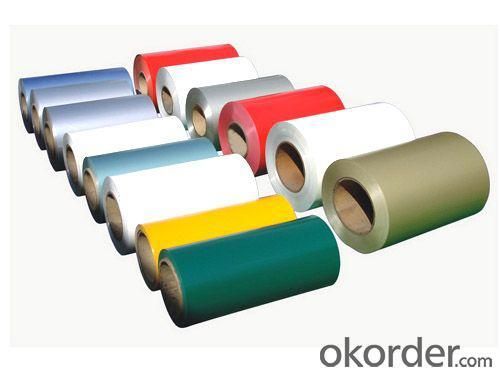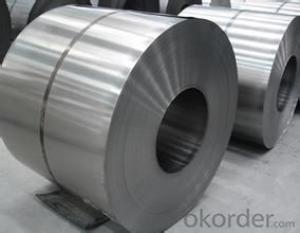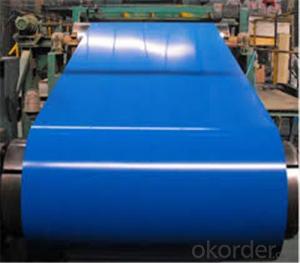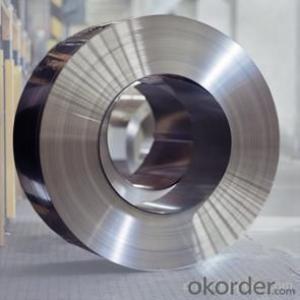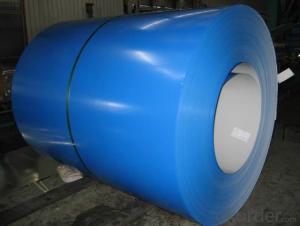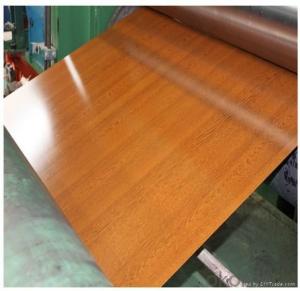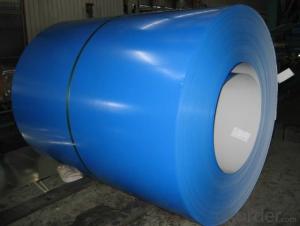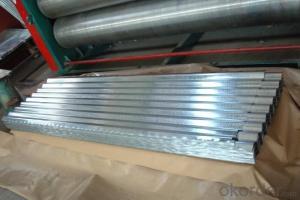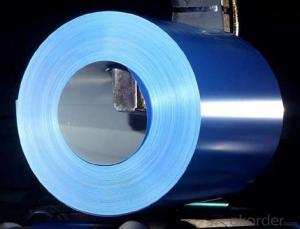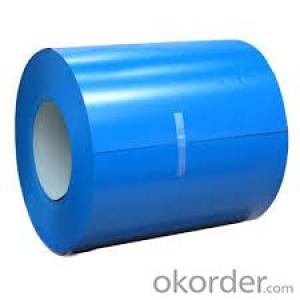Pre-Painted Galvanized Aluzinc Steel Coil High Quality
- Loading Port:
- China main port
- Payment Terms:
- TT OR LC
- Min Order Qty:
- 50 m.t.
- Supply Capability:
- 10000 m.t./month
OKorder Service Pledge
OKorder Financial Service
You Might Also Like
Specification
Pre-Painted Galvanized/Aluzinc Steel Coil from China in High Quality
Description
With GI as base material, after pretreatment (degrease and chemical treatment ) and liquid dope with several layers of color, then after firing and cooling, finally the plate steel is called pre-painted galvanized (aluzinc) steel.
Main Features
• Workability, durability
• Excellent heat resistance performance
• High strength
• Good formability
• Good visual effect
Specification
Standard: AISI, ASTM, BS, DIN, GB, JIS
Technique: Cold Rolled
Surface Treatment: Coated
Application: Boiler Plate
Special Use: High-strength Steel Plate
Width: 20-1250mm
Length: customized
commoidty: pre-painted galvanized steel coil
Thickness: 0.13-4.0mm
width: 20-1250mm
zinc coating: 40-180g/m2
printing thickness: top side: 20+/-5 microns, back side: 5-7 microns
color: all RAL color
surface treatment: color coated
coil weight: 4-7 tons
coil ID: 508/610mm
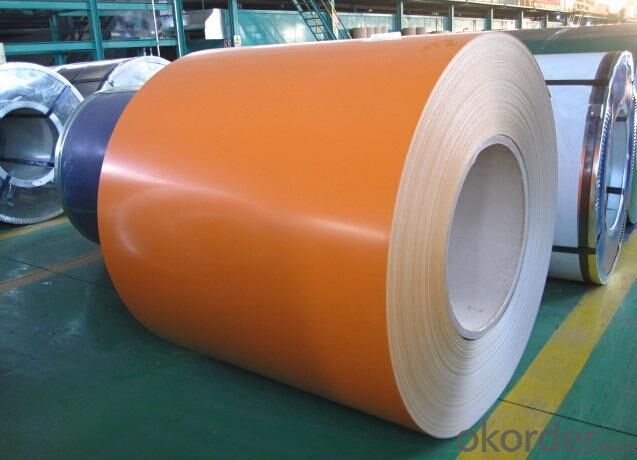
- Q: so what is stronger tempered steel Blade or carbon steel Blade? a Machete made of those i said above what will last longer,what can cut better,which will will shatter first.
- 1. all steel blades are tempered, whether they are high carbon blades or low carbon blades. 2. It depends on what kind of steel they are made from. So im going to answer this question, using the following qualifications. 440A stainless steel 440C stainless steel - high carbon. The higher the carbon level, the more brittle a blade becomes. But the higher the carbon level, will increase a steel’s wear resistance , meaning it will have a better edge retention 2. They both will work well. Pros's / Con's The 440C blades will need less sharpening, but are harder to sharpen The 4401 blades will need to be sharpened more, but are far easier to resharpen. So it basically comes down to where you will be using them and how you will be using them. If your gonna be out in the middle of the jungle and stopping for the night, then the high carbon blade would probably be better, you use it all day, resharpen it at night. If your gonna be cutting brush, tobbaco, etc on your land, then the 440A would be better, because you can take a couple of min's to resharpen it often
- Q: How are steel coils used in the production of kitchen appliances?
- Steel coils are used in the production of kitchen appliances as they are transformed into various components such as panels, frames, and structural elements. These coils are typically cut, shaped, and formed to create the necessary parts for appliances like refrigerators, ovens, and dishwashers. The high strength and durability of steel make it an ideal material for these appliances, ensuring their longevity and reliability.
- Q: Where can I find a discount online for Stainless Steel Magnetic Knife Rack
- MIU Stainless-Steel Magnetic Knife Holder List Price: $39.99 Price: $27.99 this item ships for FREE with Super Saver Shipping. Details You Save: $12.00 (30%) Product Features * Magnetic for secure hold on knives * Contemporary design * Encased in attractive 18/10 stainless steel * Measures 20 inches long, ? inch wide, 2 inches thick * 20-inch Length x .75-inch Height x 2-inch Width Product Details * Product Dimensions: 23.6 x 5.4 x 3.2 inches ; 3.8 pounds * Shipping Weight: 4 pounds (View shipping rates and policies) * Shipping: This item can only be shipped to the 48 contiguous states. We regret it cannot be shipped to APO/FPO, Hawaii, Alaska, or Puerto Rico. * Shipping Advisory: This item must be shipped separately from other items in your order. Additional shipping charges will not apply. * ASIN: B0000DZDHB * Item model number: 90009 Product Description Stainless Steel 20-inch Magnetic Knife Holder
- Q: I know aluminum is lighter but I'm looking at a 01 bianchi grizzly mountain bike which is steel. I used to ride a specialized stumpjumper m4 which was aluminum. It was quite light so I don't know if I'll like a bit heavier bike but overall what is better from those who have had both?
- Im a huge fan of steel frames. #1. they dont feel like they are bouncing off things like aluminum #2. they absorb more vibrations #3. they can be fixed if you wreck them #4. They dont weigh much more (if anymore) then aluminum #5. you are in a very limited clique #6. a steel frame will far out-live an aluminum frame. #7. it doesnt sound like your riding a tin can. #8. break a hose or cable guide, and you simply can take it down to your local muffler shop and have them weld one back on.. an aluminum frame is so fragile it will probably have to be replaced. Aluminum frames do have their pluses. #1. they are very stiff #2. you dont have to worry about rust #3. every company on the planet makes aluminum frames so they are easy to find... #4. looks. because aluminum is so stiff, there are some very radical frame designs. steel frames are just boring to look at. if you like steel frames, you wont want to go to aluminum. if you like aluminum, you could consider steel.
- Q: What is the accuracy of steel tape inspection?
- The precision is the minimum scale of this measuring tool. The minimum scale of the steel tape measure is millimeters, and the data below is the reading data,
- Q: It seems that steel would be stonger and more stable than wood, fire resistant, and better for the environment, so why are most homes wood-framed rather than steel-framed?
- Basically, it's because wood was available first and wood is still the cheaper, more widely available material. Way back when man started building dwellings similar to what we have now, steel was not an option for the masses. The process probably hadn't even been invented or perfected yet, there was not the widespread transportation of goods that we have today either. Early shelters were not even put together with nails, they use wooden pegs because metal was so expensive and not widely available. I can't say that it would be better for the environment; it takes a tremendous amount of electricity to smelt and produce metals. And you have the emissions problems from the factories and the power generation. I'd have to do more research on that one. A managed timber stand actually reduces greenhouse gasses and every scrap of that tree can be used in one form or another. The only energy expenditures are moving the trees to the saw mill, cutting at the saw mill and transportation of the goods after that point. And that would be a lot less than the power required to make the same number of feet of steel products.
- Q: This question gets beat to death from what ive seen online but im going to ask it since im searching for a few new knives. The question is as the titles states what is the best steel for a general purpose knife? I plan on buying several different types of knives, Folders, fixed blades, ect. I will carry them around with me all the time for basically anything i can think of to use it for. The reason i ask this question here is because looking online everyone has a differnt veiw. Some say stainless is too soft while others say carbon will chip and is more brittle. Even looking at just a single type of steel, carbon fort instance everyone has a different opinion as to whats best leaving me kind of lost for what i should get. Maybe the better word would be What is a good general purpose steel?. Any advice is much appreciated!!!!
- Besides the composition of the steel, the tempering is VERY important. I would buy a knife from a company with a good reputation and not worry about what material their metallurgist chose to make a high quality knife. You definitely do not have the knowledge of someone with a degree in metals and many years of experience.
- Q: What are the common surface finishes available for steel coils?
- There are several common surface finishes available for steel coils, depending on the desired application and aesthetic requirements. One of the most common surface finishes is hot-dip galvanized, which involves coating the steel coil with a layer of zinc. This finish provides excellent corrosion resistance and is commonly used in outdoor applications where the steel is exposed to moisture and harsh weather conditions. Another popular surface finish is electro-galvanized, which is achieved by applying a thin layer of zinc to the steel coil through an electroplating process. This finish also provides good corrosion resistance but is generally not as durable as hot-dip galvanized. Additionally, steel coils can be coated with a layer of paint or polymer to enhance their appearance and provide additional protection against corrosion. These coatings can be applied in various colors and finishes, such as matte or glossy, to suit specific aesthetic requirements. Furthermore, steel coils can undergo a process called mill finish, which involves leaving the steel in its raw and untreated state. This finish is often used when the steel coil will undergo further processing or coating at a later stage. Other surface finishes for steel coils include stainless steel finish, which is achieved through a passivation process to enhance the steel's resistance to corrosion, and brushed or polished finishes, which are typically used for decorative purposes. Overall, the choice of surface finish for steel coils depends on factors such as the intended use, environmental conditions, and desired appearance, with each finish offering its unique advantages and characteristics.
- Q: Are steel coils used in shipbuilding?
- Yes, steel coils are commonly used in shipbuilding. They are primarily used to manufacture various structural components and hull sections of ships due to their strength, durability, and resistance to corrosion.
- Q: which elements are alloyed to make stainless steel?A Fe, CB Fe, MnC Fe, NiD Fe, CrE Fe, Cr, Ni
- E. Stainless steel is mainly comprised of Cr and Ni. Steel is an alloy composed mainly of iron. On a side note, Carbon is not really in stainless steel and it is only less than .1%
Send your message to us
Pre-Painted Galvanized Aluzinc Steel Coil High Quality
- Loading Port:
- China main port
- Payment Terms:
- TT OR LC
- Min Order Qty:
- 50 m.t.
- Supply Capability:
- 10000 m.t./month
OKorder Service Pledge
OKorder Financial Service
Similar products
Hot products
Hot Searches
Related keywords
